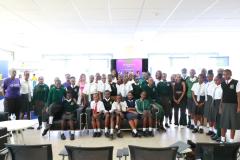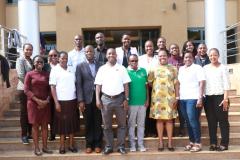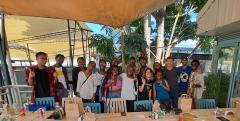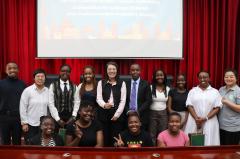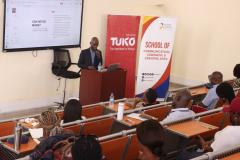- Mastercard Foundation
- Students
- Prospective Students
- Current Students
- Academic Catalog, Academic Calendar & Fee Schedule
- Student Portal (WebApp)
- Student Email
- Blackboard
- Digital Repository
- Library and Information Center
- Placement and Careers
- Resource Downloads
- Online Installment Plan Application
- Pre-Registration Check
- Search Course Schedule
- View / Download Course Catalogue
- Online Tuition Fee Refund Application
- Campus This Week
- Faculty & Staff
- Alumni
- Parents
- Helpdesk
- Home
- Academics
- Admissions
- Life At USIU-Africa
- Student Support Services
- Academic Catalog, Academic Calendar & Fee Schedule
- Academics, Transformational Teaching, Learning and Research
- Student Life
- Course Advising
- Financial Aid
- Library and Information Center
- Placement and Careers
- Gender Equity and Protection Office
- Disability and Inclusion Office
- Counseling Center
- Internships
- Student Exchange
- University Health Service
- Online Installment Plan Application
- Online Tuition Fee Refund Application
- Student Information
- Recreation
- Student Support Services
- Research
- Giving
- About USIU-Africa
- Quicklinks
Gender Equity and Protection Office
About the Gender Equity and Protection (GEP) Office
The office is responsible for ensuring adherence to the current legislation and international conventions on matters gender equity and protection within the university. Further, it provides prompt responses to and effectively stops problematic behaviour, prevent its recurrence and remedies its effects as per the provided guidelines. The office generally serves to eliminate, prevent and redress known instances of gender based misconduct or violence with fair and efficient processes that are intended to support the entire University Community.
The mandate of the Gender Equity and Protection (GEP) Office at USIU-Africa is to create and foster a campus environment free from sexual harassment, sexual gender based violence and all forms of discrimination.
USIU-Africa prohibits all forms of sexual gender based violence and discrimination on or off campus. Prohibited conduct include sexual harassment, gender based violence, sexual misconduct, harmful practices, sexual assault, interpersonal violence and all forms of gender discrimination.
The office is also tasked with providing technical oversight on gender mainstreaming and equitable transformation considerations for all USIU-Africa processes, functions and services.
Please download the GEP Brochure
COVID-19 Update
In adherence to the established COVID-19 protocols, the Gender Equity and Protection office will receive complaints remotely through channels like email, WhatsApp and phone calls.
- If you have an emergency, please call, text or send a WhatsApp message on +254 782 53 9361
- To lodge a sexual harassment, sexual gender based violence and other related forms of discrimination, please submit a report online.
- All Gender Equity or related title IX trainings are being offered via Zoom; to request or request a training, please complete a training request form.
- For any questions related to reports, accommodations or resources, please email: rngumi@usiu.ac.ke or gep@usiu.ac.ke
Policies and procedures
As part of USIU-Africa’s commitment to fostering a safe learning and working environment free from sexual harassment, gender based violence and all forms of discrimination, the university has put in place a USIU-Africa Sexual and Gender Based Violence Policy.
The same legal and policy standards that define sexual misconduct, sexual harassment, coercion or intimidation apply to the online and electronic environment.
Reporting an incident
Any person may report sexual harassment, sexual assault, gender based violence and all forms of discrimination by reporting incidents anonymously via an online reporting form. Once you report an incident, the University will support you by:
- Offering confidential support, referral and psycho-social support for survivors. Failure to report may result in negative psychological effects which may destabilize your academics and career.
- Ensuring that it allocates the requisite resources to protect you and restore dignity of survivors.
USIU-Africa believes in fair ethics and adjudication for both parties, and as such, the university will enforce disciplinary action on all parties found to be culpable.
Resources
- Gender Equity and Protection Office Brochure
- Sexual and Gender Based Violence Policy
- Sexual and Gender Based Violence Complaint Form
Contacts
For any information or assistance, please reach out to:
The Gender Equity and Protection Office,
Administration Block, 1st Floor,
Email: gep@usiu.ac.ke or rngumi@usiu.ac.ke
GBV Hotline: +254 782 539 361
By Racheal Ngumi
As part of the annual observance of the International Day of Persons with Disabilities on December 3, USIU-Africa formally launched the Disability Inclusion Center, which was established to assist the university community especially the Persons with Disabilities in accessing quality service and education in learning requirements while at an institution of higher learning. The Center provides an availability of technology through information systems, and technologies; hardware, and software whereby they are accessible and usable to Persons with Disabilities and Special Needs, thus advancing the disability mainstreaming agenda.
The annual observance of the International Day of Persons with Disabilities was proclaimed in 1992, by the United Nations General Assembly resolution 47/3. The observance of the Day aims to promote an understanding of disability issues and mobilize support for the dignity, rights and well-being of persons with disabilities. It also seeks to increase awareness of gains to be derived from the integration of persons with disabilities in every aspect of political, social, economic and cultural life.
In its Disability Policy, USIU-Africa commits to providing equal opportunities and support to all its diverse members including Persons with Disabilities and Special Needs. The university further recognizes and respects the rights of specific individual and group needs of Persons with Disabilities and Special Needs. Moreover, the University shall, therefore, progressively provide reasonable adjustments for inclusive and quality education to enable them actualize their full potential.
Disability Inclusion is a life transforming event for persons with disabilities. This video demonstrates how USIU-Africa, and other partners of the Mastercard Foundation are working together to break down systematic barriers to inclusion and create accessible opportunities in education and work.
By Racheal Ngumi
This Day is an opportunity to promote full and equal access to and participation in science for women and girls. This year, the International Day of Women and Girls in Science (IDWGIS) will focus on the role of Women and Girls in Science as relates to the Sustainable Development Goals (SDGs). Particular focus is on SDG 6 (clean water and sanitation), SDG 7 (affordable and clean energy), SDG 9 (industry, innovation, and infrastructure), SDG 11 (sustainable cities and communities) and SDG17 (means of implementation). In effect, how the contribution of women and girls in these areas will affect sustainable development in their respective countries.
The IDWGIS aims to connect the International Community to Women and Girls in Science, strengthening the ties between science, policy, and society for strategies oriented towards the future. The IDWGIS will enable demonstration and illustration of best practices, strategies, applied solutions in addressing SDGs challenges and opportunities.
Some of these best practices extend to aspects of gender equality which has been a core concept to enhance empowerment of women and girls that will enable economic development and growth. Bridging gender gaps to enhance accessibility to innovation and technology will enhance women and girls participation and decision making on themes at all levels of Science, Technology, Engineering and Mathematics (STEM) disciplines all over the world. This will ensure that steps are made towards increasing their participation in higher education, while still being represented in these fields.
Diversity encourages sustainable development which in turn expands the research pool of talented researchers, bringing in fresh perspectives, talent and creativity. Women and girls participating in these programs encourages new ideas and gives solutions to problems in the community and the society. This Day is a reminder that women and girls play a critical role in science and technology communities and that their participation should be strengthened.
By Racheal Ngumi
Last Friday, the Office of Gender Equity and Protection in collaboration with the Office of Disability Inclusion hosted a workshop on gender sensitivity and self-advocacy for students with disabilities. The workshop, which was attended by over 100 Scholars and facilitated by Ms. Racheal Ngumi and Ms. Pamela Marigu, saw the participants taken through the nuances of gender-inclusive language, providing students with disabilities a platform to cultivate skills that contribute to a more inclusive academic environment.
The Scholars were taken through the description, importance and types of gender- sensitive language, which refers to using terms and expressions that avoid bias and stereotypes based on gender. It promotes inclusivity and equality for persons with disabilities in the learning environment.
“Gender Sensitive Language is essential in shaping how people perceive the world and helps people build cultural and social understanding in society. Our communication contributes to the attitudes and norms we have in society. The use of gender-sensitive language is one way to promote gender equality, break down gender stereotypes and barriers and change social and cultural attitudes,” said Ms. Marigu.
During the session, the Scholars got the opportunity to delve into self-advocacy and how to nurture their skills in the area to better advocate for themselves.
The term self-advocacy and its philosophy was born in Sweden in the 1960s, when young adults with disabilities began speaking out and taking control of their own lives by forming their own leisure clubs. National conferences for these club members were held in 1968 and 1970, wherein participants developed statements about how they wanted to be treated. In light of this, the term self-advocacy is defined as the ability to articulate one’s needs and make informed decisions about the support necessary to meet those needs.
The facilitator, Ms. Racheal Ngumi encouraged the Scholars to practice self-advocacy, noting that it would allow them to clearly ask for what they need, which in turn would empower them to make the necessary plans to achieve their goals.
“Learning self-advocacy for reasonable accommodations ensures that you will receive what you need in order to be successful with assigned tasks not only in your personal but also your professional lives. Through self-advocacy, you will be able to enjoy a higher quality of life, as you will build your self-esteem and have confidence in yourselves, know how to properly express your feelings as you become more empowered to make your own decisions,” she said.
The workshop underscored USIU-Africa's commitment to creating an inclusive campus environment that prioritizes the needs of every student. The Office of Gender Equity and Protection Office and the Office of Disability Inclusion are committed to championing campus-wide initiatives that promote inclusivity and empower students to navigate their academic journey with confidence.
By Mercy Tania and Terry Odhiambo
The Criminal Justice Club recently visited the Directorate of Criminal Investigation’s New National Forensic Laboratory in Nairobi on August 1, 2023. The trip was nothing short of an enlightening expedition into the heart of modern crime-solving techniques. From crime scene investigations to cybercrime, ballistics to explosives, imaging, and acoustics to fingerprints and document examination, each facet of this multifarious discipline plays an indispensable role in the pursuit of justice.
In their courses, criminal justice students frequently examine theoretical concepts. Visiting the DCI allowed them to see these principles in action. They were able to observe how different investigative methods, tools, and procedures are used in real-world criminal investigations. As witnessed during the tour, criminal investigation is a multifaceted field that includes a variety of specialist teams. By witnessing these distinct units at work, ranging from crime scene analysis to cybercrime investigations, ballistics, explosives, digital forensics, and more, students received insight into the various components of a criminal investigation.
Students were exposed to cutting-edge equipment and tactics utilized in solving modern-day crimes by visiting the Directorate. Understanding how technology may help with investigations is essential for remaining current in the profession. With technological improvements, the criminal investigative sector is continually evolving. Criminal investigations frequently necessitate collaboration among many divisions and expertise. Seeing how these units operate together as a cohesive force taught students the significance of teamwork and cooperation in solving challenging issues.
Criminal justice students got to see firsthand the difficulties that field investigators confront, such as coping with limited resources, time limits, and the ever-changing nature of criminal activity. This experience allows students to understand the criminal justice system's intricacies genuinely.
Students may have experienced moral dilemmas and the need to adhere to ethical norms in the quest for justice throughout their visit. Understanding the ethical components of criminal investigations is critical for prospective criminal investigators. Witnessing the experts' dedication and enthusiasm at the Directorate may have inspired criminal justice students to seek careers with a purpose and commitment to upholding justice. Visits to professional groups such as the DCI allow students to network with seasoned professionals, which may lead to internships, job opportunities, or mentorship that greatly benefit their future careers.
This visit helped to bridge the gap between theoretical knowledge and practical practice. Students were able to see how the topics they learned in class were put into action during actual criminal investigations. Experiencing the world of criminal investigation firsthand challenged students to think critically, adjust to new situations, and improve their problem-solving abilities, all of which contributed to their personal and professional development. The visit to the Directorate of Criminal Investigation was a transformative experience for criminal justice students, providing them with a thorough understanding of the field, reigniting their passion for justice, and preparing them for the challenges and responsibilities that await them in their careers.
Featured Documents [ More ]
Latest News [ More ]
- Artificial Intelligence and the Media IndustryApr 05, 2024

